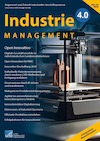Search


Bibtex
Cite as text
@Article{Weiher+Riedelsheimer+Lindow,
Cite-key = "Weiher2023Dim",
Year= "2023",
Number= "6",
Volume= "IM 39",
Pages= "42-45",
Journal = "Industrie 4.0 Management",
Title= "Dimensions of Industrial Openness - Understanding Openness and Its Implications for Sustainable Transformation",
Author= "Nils Weiher, Theresa Riedelsheimer, Kai Lindow,
Fraunhofer Institute for Production Systems and Design Technology IPK",
Doi= "https://doi.org/10.30844/IM_23-6_42-45",
Abstract= "The topic of Openness is of growing importance for industry, especially in Europe. However, the term Openness is used very differently. Openness includes several concepts, including Open Source Hardware, Open Source
Software, Open Data, Open Standards, Open Innovation, Open Science and Open Education. The concepts address different dimensions of Openness, all based on some kind of participation and with the goal to create more transparency and accessibility. This article defines the concepts and provides a basic understanding of their importance for industry and for greater sustainability.",
Keywords= "Openness, Open Source Software, Open Source
Hardware, Open Data, Open Standards, Open
Innovation, Open Science, Open Education,
Sustainability, Circular Economy",
}
Nils Weiher, Theresa Riedelsheimer, Kai Lindow,
Fraunhofer Institute for Production Systems and Design Technology IPK(2023): Dimensions of Industrial Openness - Understanding Openness and Its Implications for Sustainable Transformation. IM 396(2023), S. 42-45. Online: https://doi.org/10.30844/IM_23-6_42-45 (Abgerufen 21.02.26)
Open Access
Abstract
Abstract
The topic of Openness is of growing importance for industry, especially in Europe. However, the term Openness is used very differently. Openness includes several concepts, including Open Source Hardware, Open Source Software, Open Data, Open Standards, Open Innovation, Open Science and Open Education. The concepts address different dimensions of Openness, all based on some kind of participation and with the goal to create more transparency and accessibility. This article defines the concepts and provides a basic understanding of their importance for industry and for greater sustainability.
Keywords
Schlüsselwörter
Openness, Open Source Software, Open Source Hardware, Open Data, Open Standards, Open Innovation, Open Science, Open Education, Sustainability, Circular Economy
References
Referenzen
[1] Schlagwein, D.; Conboy, K.; Feller, J.; Leimeister, J. M.; Morgan, L.: ‘Openness’ with and without Information Technology: A Framework and a Brief History. In: Journal of Information Technology 32 (2017) 4, pp. 297-305.
[2] Splitter, V.; Dobusch, L.; Von Krogh, G.; Whittington, R.; and Walgenbach, P.: Openness as Organizing Principle: Introduction to the Special Issue. In: Organization Studies 44 (2023) 1, pp. 7-27.
[3] Bonvoisin, J.: Implications of Open Source Design for Sustainability. In: Setchi, R.; Howlett, R. J.; Liu, Y.; Theobald, P. (eds): Sustainable Design and Manufacturing. Cham 2016, pp. 49-59.
[4] Lindman, J.; Nyman, L.; The Businesses of Open Data and Open Source: Some Key Similarities and Differences. In: Technology Innovation Management Review 4 (2014) 1: Open Source Business, pp. 12-17.
[5] CED. Open Standards, Open Source, and Open Innovation: Harnessing the Benefits of Openness. Digital Connections Council of the Committee for Economic Development (CED), 2006, pp. 119-176.
[6] Powell, A.: Democratizing Production through Open Source Knowledge: From Open Software to Open Hardware. In: Media, Culture & Society 34 (2012) 6, pp. 691-708.
[7] OKF. How to Open up Data. The Open Data Handbook by Open Knowledge Foundation (OKF). https://opendatahandbook.org/guide/en/how-to-open-up-data/, accessed March 30, 2023.
[8] Hess, C.; Ostrom, E. (eds): Understanding Knowledge as a Commons: From Theory to Practice. Cambridge, MA 2007.
[9] OKF. Open Definition 2.1 – Open Definition – Defining Open in Open Data, Open Content and Open Knowledge. Open Knowdledge Foundation (OKF). URL: opendefinition.org/od/2.1/en/, accessed March 19, 2023.
[10] FSFE. Free Software – FSFE. FSFE – Free Software Foundation Europe. URL: fsfe.org/freesoftware/ freesoftware.html, accessed March 30, 2023.
[11] OSI. The Open Source Definition v1.9. Open Source Initiative (OSI). URL: opensource.org/osd/, accessed March 28, 2023.
[12] SPDX. SPDX License List | Software Package Data Exchange (SPDX) Version: 3.20. The Software Package Data Exchange (SPDX). URL: spdx.org/licenses/, accessed March 30, 2023.
[13] OSHWA. Open-Source-Hardware Definition 1.0. Open Source Hardware Association OSHWA. URL:
www.oshwa.org/definition/, accessed March 31, 2023.
[14] ITU. Definition of “Open Standards.” International Telecommunication Union (ITU). URL: www.itu.int:443/en/ITU-T/ipr/Pages/open.aspx, accessed March 30, 2023.
[15] OSGeo. Open Source and Open Standards – OSGeo Whitepaper. Open Source Geospatial Foundation Wiki. URL: wiki.osgeo.org/wiki/Open_Source_and_Open_Standards, accessed March 19, 2023.
[16] Bogers, M.; Chesbrough, H.; Moedas, C.: Open Innovation: Research, Practices, and Policies. In: California Management Review 60 (2018) 2, pp. 5-16.
[17] Vicente-Saez, R.; Martinez-Fuentes, C.: Open Science Now: A Systematic Literature Review for an Integrated Definition. In: Journal of Business Research 88 (2018), pp. 428-436.
[18] Vrana, R.: Open Educational Resources (OER) as Means of Promotion of Open Education. Presented at the 2021 44th International Convention on Information, Communication and Electronic Technology (MIPRO) in Opatija, HR.
[19] Eisenmann, T. R.; Parker, G.; Van Alstyne, M. W.: Opening Platforms: How, When and Why?. In: SSRN Electronic Journal (2008).
[20] Broekhuizen, T. L. J.; Emrich, O.; Gijsenberg, M. J.; Broekhuis, M.; Donkers, B.; Sloot, L. M.: Digital Platform Openness: Drivers, Dimensions and Outcomes. In: Journal of Business Research 122 (2021), pp. 902-914. DOI: doi.org/10.1016/j.jbusres.2019.07.001.
[21] Scherer, A. G.; Voegtlin, C.: Corporate Governance for Responsible Innovation: Approaches to Corporate Governance and Their Implications for Sustainable Development. In: Academy of Management Perspectives 34 (2020) 2, pp. 182-208.
[22] Phonthanukitithaworn, C.; Srisathan, W. A.; Ketkaew, C.; Naruetharadhol, P.: Sustainable Development towards Openness SME Innovation: Taking Advantage of Intellectual Capital, Sustainable Initiatives, and Open Innovation. In: Sustainability 15 (2023) 3, p. 2126.

 English
English